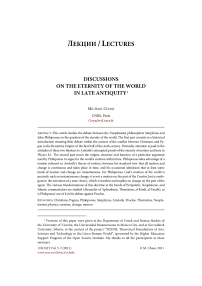Discussions on the eternity of the world in late antiquity
Автор: Chase Michael
Журнал: Schole. Философское антиковедение и классическая традиция @classics-nsu-schole
Рубрика: Лекции
Статья в выпуске: 2 т.5, 2011 года.
Бесплатный доступ
This article studies the debate between the Neoplatonist philosophers Simplicius and John Philoponus on the question of the eternity of the world. The first part consists in a historical introduction situating their debate within the context of the conflict between Christians and Pagan in the Byzantine Empire of the first half of the sixth century. Particular attention is paid to the attitudes of these two thinkers to Aristotle's attempted proofs of the eternity of motion and time in Physics 8.1. The second part traces the origins, structure and function of a particular argument used by Philoponus to argue for the world's creation within time. Philoponus takes advantage of a tension inherent in Aristotle's theory of motion, between his standard view that all motion and change is continuous and takes place in time, and his occasional admission that at least some kinds of motion and change are instantaneous. For Philoponus, God's creation of the world is precisely such an instantaneous change: it is not a motion on the part of the Creator, but is analogous to the activation of a state (hexis), which is timeless and implies no change on the part of the agent. The various transformations of this doctrine at the hands of Peripatetic, Neoplatonic, and Islamic commentators are studied (Alexander of Aphrodisias, Themistius, al-Kindi, al-Farabi), as is Philoponus' use of it in his debate against Proclus.
Simplicius, aristotle, proclus, neoplatonism, physics, creation, change, motion, christians, pagans, philoponus, themistius
Короткий адрес: https://sciup.org/147103321
IDR: 147103321


